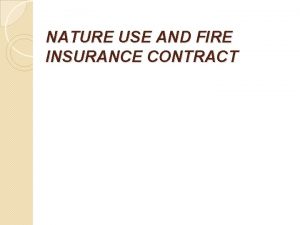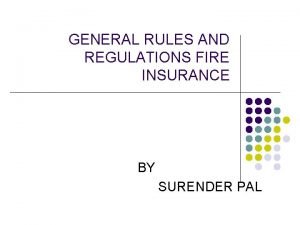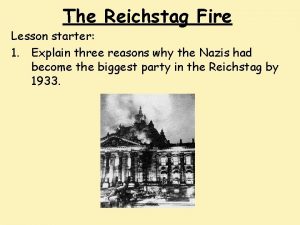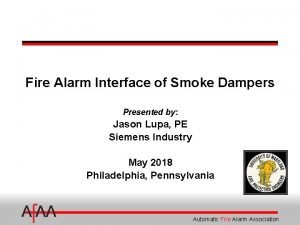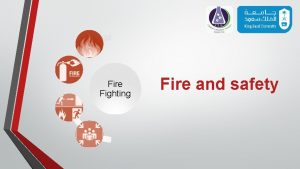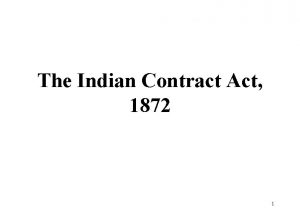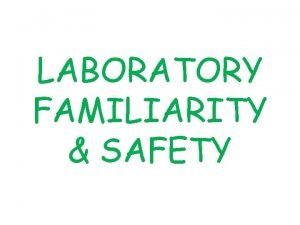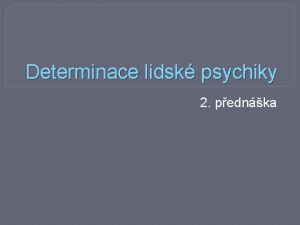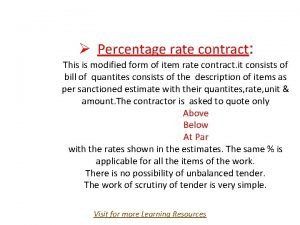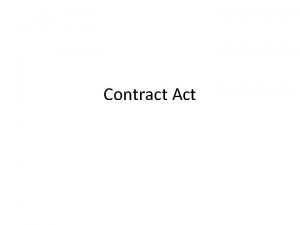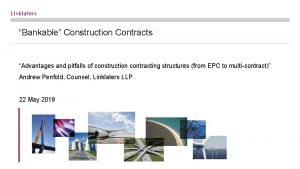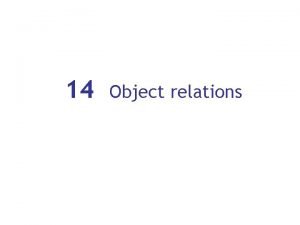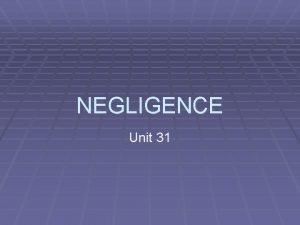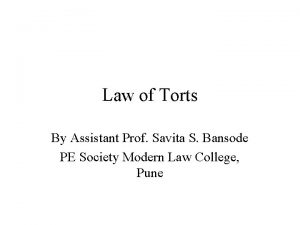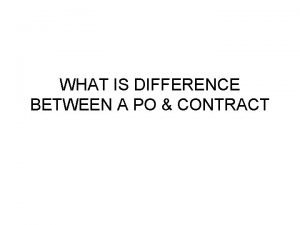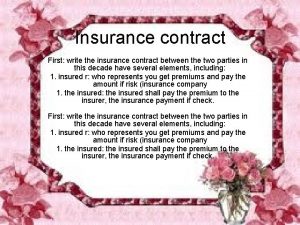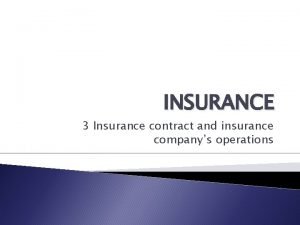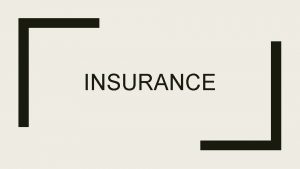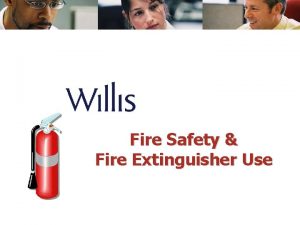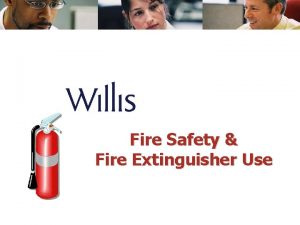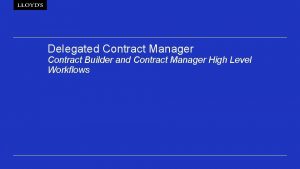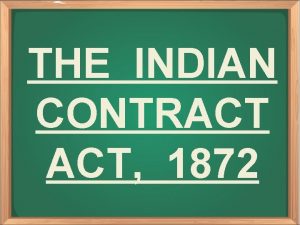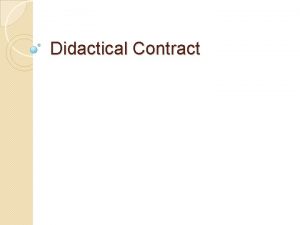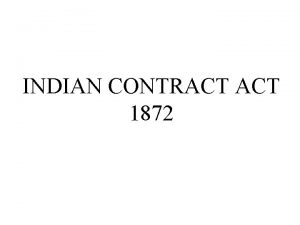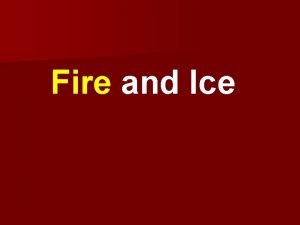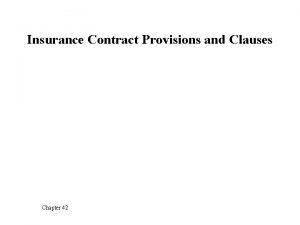NATURE USE AND FIRE INSURANCE CONTRACT NATURE AND
























- Slides: 24

NATURE USE AND FIRE INSURANCE CONTRACT

NATURE AND USE OF FIRE INSURANCE Fire insurance has not a long history. The real establishment of fire insurance came only after the great fire of London in 1066. This fire lasted for four days and nights burning over 436 acres of ground and destroying over 13, 000 buildings was the most disastrous fire in history and forcibly awakened the people to the necessity for a form of protecting against such calamities. DEFINITION: Section 2 of the Insurance Act 1938 defines fire insurance as “the business of effecting, otherwise than incidentally to some other class of insurance business, contract of insurance against loss by or incidental to fire or other occurrence customarily included among the risks insured

NATURE OF FIRE INSURANCE The occurrence of a fire will result not only in loss or damage to material property but also other consequential losses such as loss of production causing loss of profit. The function of fire insurance is to make good the financial loss suffered as a result of fire. Some of the insurable properties are buildings, electrical installation contents of building such as machines plant and equipment accessories, etc goods such as raw materials, goods in process, finished goods, goods in a open or in the premises, contents in dwellings, shops, hotels furniture, fixture and fittings and other movable and immovable properties.

FUNCTIONS The function of fire insurance is to compensate for the loss consequent upon destruction by fire. It relieves the insured from the horror of fire losses for which he is exposed. Thus the individual owner by taking fire insurance can prevent the fire waste to some extent. The insurer act as a middle man between all the members of the society who are exposed to the fire risk on the one hand the members who will be the actual victims of the fire losses on the other. The insurer charge the premium from all the insured members and makes good the losses when they occur to any of them.

CAUSES OF FIRE 1. PHYSICAL HAZARD It refers to inherent risk of fire in the property which may occur due to inflammable nature, construction, artificial lighting and heating, lack of extinguishing apparatus use of the property etc. 2. MORAL HAZARD The moral hazard depends upon the man. The property may be set on fire by the owner or by any person with his willingness, carelessness and lack of sense of duty may also increase the fire waste. Where the property was destroyed with the willingness of the PHYSICA L HAZARD MORAL HAZARD

PREVENTION OF LOSS 1. INDEMNIFICATION OR CURATIVE EFFORTS According to doctrine of indemnification, the financial loss suffered by the perils insured against will be compensated in full, not more than this or not less than this. 2. PREVENTIVE EFFORTS The loss cannot be prevented by insurance but the insurer help those who are engaged in preventive efforts by granting financial and other assistance. Fire insurers stimulate the installation of protective devices and better types of constructions PREVENTIO N OF LOSS Indemnificatio n or curative efforts Private activities Preventive efforts Public fire prevention activities

Preventive efforts are divided into two parts: 1. Private activities: These activities includes those activities in which the property owner may engage in for the purpose of preventing fire loss. Insurers give sincere advice of financial help to property owner on the following factors: construction Fire services occupation Managemen t exposure

2. Public fire prevention activities: Fire insurers have performed numerous important services to reduce the fire waste with the help of public institutions which are engaged in fire fighting activities. Community surveys Standard schedule for grading cities Underwriters laboratories equipments Legislation and regulation

GENERAL DEVICES � The insurer compensates loss at a reasonable cost. � Serious hazards are to be cooperatively reinsured. � Loans are provided for better construction and building. � Fire insurers stimulate the installation of protective devices to reduce losses. � Fire fighting methods are organised with public utility concerns. � Insurers investigate the causes of loss and attempts are made to reduce the causes. � Insurers study various devices for fire proof , protection and problems of special processes. � Periodical examination of insured property is made and instructions are issued for the purpose of investigation.

FIRE INSURANCE CONTRACT � Fire insurance contract may be defined as ”an agreement whereby one party in return for a consideration undertakes to indemnify the other party against financial loss which the latter may sustain by reason of certain defined subject-matter being damaged or destroyed by fire or other defined perils up to an agreed amount. ”The contract of insurance involve all the elements of an ordinary contract and insurance contracts.

ELEMENTS OF FIRE INSURANCE CONTRACT Features of General Contract: (a) Proposal: -The proposal for fire insurance can be made either verbally or in writing. The proposer gives us the necessary description of the property tobe insured. Introduction, type of properties, values of properties, construction, occupation etc. (b)Acceptance: -On receipt of the proposal form, the insurer will assess the risk. sometimes, when the contents and subject –matter are not of very amount, the insurer may accept on the basis of proposal forms only. sometimes the insurer may send his surveyor to survey the property. As soon as the proposal is accepted, the assured is informed about the decision.

FIRE: -Fire in order to make the insurer liable under the contract, must satisfy two conditions. First, there should be actual fire or ignition, and second, the first must be fortuitons in its nature. IGNITION: -The expression in the policy we have to construct is loss or damage occasioned by fire. This means that loss or damage must br either by ignition of the article or property or premises or part thereof. In other words, the damage should be occasioned by fire. FIRE SHOULD BE ACCIDENTAL AND NOT INTENTIONAL: -Any loss caused by fire lighted purposively is not a loss by fire if it was intentional. However the property burned accidentally in an ordinary fire, such as domestic fire, the loss is covered even if the fire remains under control.

CONTINUE…. . (c)Commencement of risk: -The risk commences as soon as the contract is completed provided there is no specific time for the purpose. As soos as the proposal is accepted, risk will commence irrespective of the fact that no policy was issued and no premium was paid. where risks are unknown and tremendous, the payment of premium will be the basis of the completion of the contract. (1) COVER NOTE: -The insurer issues a ‘cover note’ when the risk was accepted provisionally or subject to the condition of payment of premimum. This note will cover the property so far the final policy has not been issued.

� POLICY: -The insurer issues a duly stamped policy which will bear all the terms and conditions of the contract. Any contract of fire insurance, comes within the meaning of the word ‘policy’. It is a statutory and formal document of insurance contract. There are different forms of policies for different type of policies. However, a standard form is also used. � PERIOD OF FIRE INSURANCE POLICIES: -Usually fire policies are issued for one year and are called ‘Annual Insurance’. Policies issued for a period shorter than one year are known as ‘short-term Policies’and those issued for a period more than one year are called ‘Long-Term Policies’. � MORE THAN ONE FIRE DURING A PERIOD: -When there is more than one fire in recpect of the same subject matter insured, the insurer is not bound to pay more than the sum assured. During the policy- life, payment of each loss, automatically, reduce the amount of the policy by the amount so paid.

(2) INSURABLE INTEREST Insurable interest is the general principle of insurance without which an insurance cannot lawfully be enforced for an insurance unsupported by an insurable interest woud be a gambling transaction. Insurable interest will be there where the subject-matter should be in such a position that the insured may suffer loss at the time of damage and may gain by its protection. The insurable interest in fire insurance must be present at the time of contract and at the time of loss. The following conditions must be fulfilled to constitute an insurable interest: (1)There should be a physical object capable of being damaged or destroyed by fire. (2)The object must be the subject matter of insurance (3) The insured must stand in such relationship as recignized by law where the insured is benefited by the safety of the subject matter or be prejudiced by its loss.

CONTINUE……. The following persons have insurable interest in the subject matter concerned: � The owner of the property or asset whether fixed or current has as insurable interest whether he is the legal owner or the equitable owner. � An agent has insurable interest in the property of his principal. � A partner has an equitable interest in the firm’s property. � A creditor has an insurable interst in property on which he has a lien for the debt. � An insurer has it in respect of risks undertaken by him for the purpose of reinsurance. � A bailee can insure any article or property bailed. � A trustee has insurable, interest in the property put on trusteeship.

(3) PRINCIPLE OF GOOD FAITH The contract of fire insurance is one in which the observance of the utmost good faith-uberrima fides-by both the parties are of vital significant. The utmost good faith in fix insurance has two aspects-first, disclosure of material facts and second, preservation of the property insured. The insurer and the insured must furnish detailed information regarding the subject- matter to be insured. The insured, since he has more, information about the subject-matter, must disclose all the information asked truly and fully. If the assured has not observed good faith, the contract can be avoided by other party. It was immaterial toplead that the insured was unaware of the fact and could not disclose. The second phase of good faith is preservation of property. Thus, the observance of good faith is necessary not only during the negotiation of the contract but throughtout the term of the policyand in making claims. Any change after commencement of risk must be communicated to the insurer.

EXCEPTIONS 1. 2. 3. 4. 5. All those circumstances which diminish the risk. All those facts which are known or reasonably presumed to be known to yhe insurer. Information which are of common knowledge. Those facts which the insurer in the ordinary course of his business ought ti know or whiich the insurer ought reasonably to have inferred from the datails given. Those facts which are superfluous to disclose by reason of a condition or warranty.

(4) PRINCIPLE OF INDEMNITY The doctrine of indemnity aims to compensate the insured for a loss sustained, and the compensation should be such as to place him as nearly as possible in the same pecuniary position after the loss as he occupied immediately before the occurrence. The insured cannot claim anything in excess of the amount required to recoup the actual loss sustained. The law doesn’t sanction any insurance which would enable the insured to profit by the destruction of the thing destroyed. The assured amount is not the measure of indemnity but it sets an upper limit up to which the loss can be indemnified. The actual amount of indemnity will be the market value of the subject-matter destroyed or damaged by the fire at the time and place of the occurrence of fire. It will never exceed the assured amount. When the actual loss is more than the assured amount then only the insured sum will be paid and nothing more is paid. But , this principle dosen’t hold good when the policy is valued policy.

INTERPRETATION OF INDEMNITY The insured is antitled to perfect indemnity subject to the sum assured being sufficient. But, in practice such perfection may be difficult to attain. Previously, the meaning of the word ‘indemnity’ was understood in the sence of material indemnity only, i. e, tangible and material property only. The intangible loss, i. e. , loss of profit, rent, etc, was not compensated. Now, the insurance is extended to cover not only the material loss of property insured but also to cover the ‘consequential loss’. CONSEQUENCES OF INDEMNITY The insured may claim only the amount of the loss sustained. 2. In case of partial damage, the insured may claim compention only for the amount of damage done. 3. The insured must transfer ti the insurere any rights which he may possess against a third party in respect of the loss. 1.

(5) DOCTRINE OF SUBROGATION Subrogation means the right of one person to stand in the place of another and to avail himself of the latter’s rights and remedies. The prinsiple of subrogation is just a corollary to the principle of indemnity. The insured can realise only the actual value of the loss oe damage to the property according to the principle of indemnity and it follows that if the damaged property has any value left or the assured can recover the lost property or has any right against a third party regarding that property. These must pass on to the insurer. The right of subrogation is exercisable at common law after insurer has paid the claim made against him.

(6) WARRANTIES The contents of proposal form are expressly incorporated in the policy, which form warranty. Warranty is that by which the assured undertakes that some particular thing shall or shall not be done, or that some conditions shall be fulfilled or whereby he affirms or negative the existence of a particular state of facts. Warranties must be complied with literally and the effect of a warranty is to render void the relevant item of the policy, even if no increase in risk is involved. However, if the policy is renewed and there was breach of a warranty before the renewal date and not after it and a loss occurs after the renewal is effected, in such a case the claim can be made. Non- compliance with a warranty prior to the current renewal period of a policy is not a bar to a claim. The non-compliance with a warranty avoids a cover only during the period of insurance in which the breach occurred.

(7) PROXIMATE CAUSE The rule is that immediate and not the remote cause is to be regarded cause proxima non-remota spectature. Proximate cause is very important in fire insurance. The principle of proximate cause has already been discussed in detail. The insurer always takes the proximate cause while paying the claim. If the property insured is burned but the fire was preceded and brought into operation by an excepted peril, the legal position depends upon whether the excepted peril was the proximate. The remote cause is when an incendiary bomb damaged the property, the proximate cause is enemy action

THANK YOU
 Insurance proposals fire insurance
Insurance proposals fire insurance Ifrs 15 steps
Ifrs 15 steps Contingent contract and wagering agreement
Contingent contract and wagering agreement Floater declaration policy in fire insurance
Floater declaration policy in fire insurance Reichstag fire who was the fire starter
Reichstag fire who was the fire starter Damper fire alarm
Damper fire alarm Uttar pradesh fire prevention & fire safety rules, 2005
Uttar pradesh fire prevention & fire safety rules, 2005 Ire fire fire rwi
Ire fire fire rwi Fire extinguisher parts
Fire extinguisher parts Nature of indian contract act 1872
Nature of indian contract act 1872 Nature of risk example
Nature of risk example How to use fire extinguisher
How to use fire extinguisher Tpass meaning fire extinguisher
Tpass meaning fire extinguisher Nature and nature's law lay hid in night
Nature and nature's law lay hid in night How you use ict today and how you will use it tomorrow
How you use ict today and how you will use it tomorrow Nature nature controversy
Nature nature controversy Percentage rate
Percentage rate Difference between job costing and contract costing
Difference between job costing and contract costing Quasi contracts
Quasi contracts Ilia ditiatev
Ilia ditiatev Equals and hashcode contract
Equals and hashcode contract Contract and lease management sap
Contract and lease management sap Sayers v harlow
Sayers v harlow Chesmore vs richards
Chesmore vs richards Difference between po and contract
Difference between po and contract
